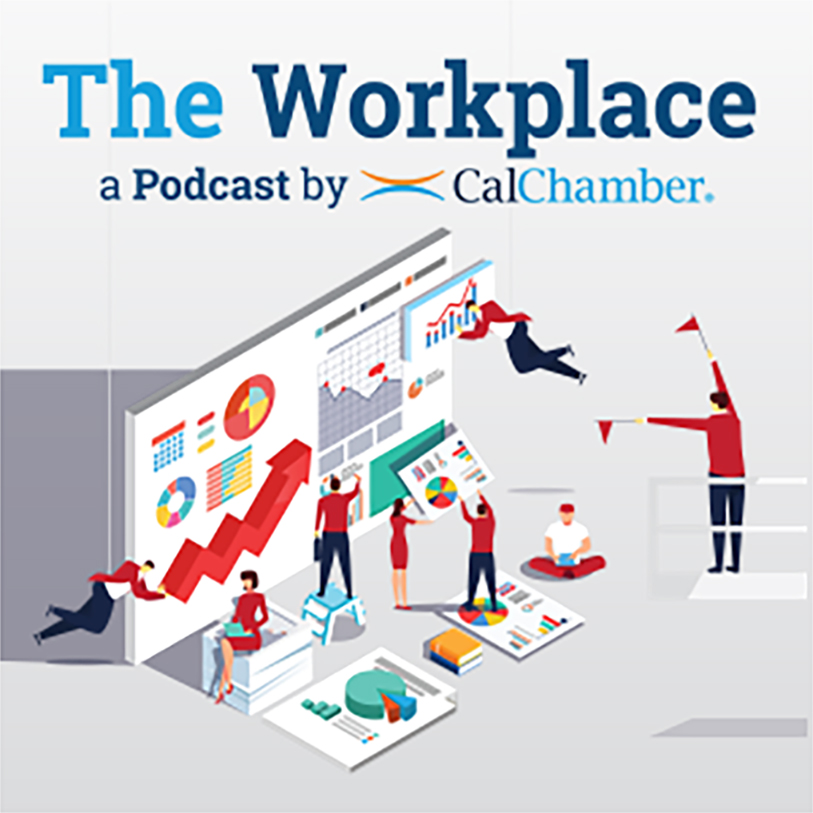In this episode of The Workplace podcast, CalChamber employment law experts Matthew Roberts and Bianca Saad discuss California holiday wage and hour issues, including holiday pay, policy best practices, employees calling out sick, and handling vacation requests.
Around this time of year, many employees are ready for rest and relaxation and will ask for time off, Roberts says in kicking off the podcast.
Wage and hour issues are hot topics right now, and what employers should keep in mind first is that “California…doesn’t require employers to provide holiday pay, even for holidays that are recognized at the state or federal level,” Saad says.
Do Employers Have to Pay for Holidays?
When the federal government recognized Juneteenth as a holiday earlier this year, many employers called into the CalChamber Labor Law Helpline asking whether they needed to close the business for the day and if they had to pay their employees for the holiday, Roberts says.
Holidays, he explains, are the exclusive province of the employer, and so a business doesn’t have to shut down for a holiday nor are employers required to pay employees for that holiday.
“Whatever you do with the holidays is going to be based upon your policy,” Roberts stresses.
Holiday Policy
When creating a holiday policy, employers may consider differentiating between the classes of employees who are going to receive holiday pay, Saad suggests. For example, full-time employees might receive holiday pay, but part-time employees don’t.
The holiday schedule is also up to the employer. Employers can set up the schedule at the start of the year and send the schedule to employees to let them know what holidays will be paid.
Lastly, Roberts says, employers may include in their holiday policy other considerations, such as whether an employee’s holiday pay may be denied if they don’t work the day before or after a holiday.
Pitfalls
If an employer chooses to deny holiday pay for employees who fail to work the day before or after a holiday, the employer should be careful to abide by California’s paid sick leave law, Saad warns.
The state’s paid sick leave law includes a discrimination provision that forbids employers from taking retaliatory or punitive actions against an employee who is using their paid sick leave as protected time.
“So, if an employee were to call out sick and they’re using their protected, paid sick leave time under California law, then they cannot be punished, so to speak, in being denied that holiday pay,” Saad explains.
If, however, an employee is absent for reasons not covered by the paid sick leave law, or has no sick leave available, the employee is not protected and could be denied holiday pay.
Holiday Pay on Top of Hours Worked
Not all businesses can shut down for the holidays, so some grant additional benefits in order to encourage employees to work during the holidays, Roberts points out. The Labor Commissioner takes the position that if an employer grants holiday pay, then it is a form of contract with the employees to provide them that pay in some form.
What can employers do to handle holiday pay issues when employees actually have to work on employer-designated holidays?
Employers have different options, Saad answers. Employers can pay for all hours worked, plus holiday pay at straight time or pay for all hours worked and provide them another day off instead. Moreover, employers do not have to pay the premium rate (time-and-a-half). So, ultimately, it’s up to the employer and what is stated in the company’s policy.
Setting these details in the company’s policy is a best practice because when it’s spelled out, there’s no confusion, Roberts says. Oftentimes employees have misconceptions because they will hear about other employees at other companies getting time-and-a-half for working during certain holidays. But this isn’t required under California law and is up to the employer’s policy.
Exempt Employees
Paying exempt employees for holiday work is a bit different.
“…exempt employees are going to be paid for the whole week, if they have performed any work in that week, even if the employer shuts down for the holiday,” Saad explains.
As long as the exempt employee worked any day within the week, they are going to be paid for the whole week, even though there was that closure for the holiday, she says.
Overtime
Roberts explains that because the hours paid for holidays are not hours that are actually worked, they don’t go toward overtime.
“So, an employee could work five days a week, 40 hours in a week and get an additional eight hours of holiday pay. And there will be no overtime there because they didn’t actually work those eight hours of holiday pay,” he says.
Vacation Requests
If employers have a busy season, where certain quotas or deadlines need to be met, they may adopt policies that limit the amount of vacation that employees can request, so long as the policy is applied consistently and is clearly communicated in the company’s policy, Saad says.
If, however, an employee is asking to take time off and have protected leave time or is asking for time off related to a religious accommodation, then the employer will need to engage in the interactive process with the employee.
CalChamber members can take the Holiday Pay Quiz to test their knowledge about pay for religious holidays, paid holidays and other days off that could be considered a holiday. Not a member? See what CalChamber can do for you.



